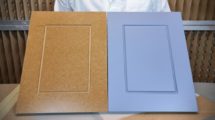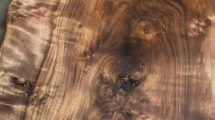That's what a question I received the other day sounded like. If the right products are chosen, the steps won't scratch and will look really good. Wax and oil are considered to be products without resistance to scratching, abrasion and mechanical impact, so many choose other products to protect stairs or wooden floors. There are, however, several types of oil and wax, both natural and synthetic, and their strengths vary widely. Products specially formulated to protect stairs and floors are advertised as such (floor wax, hard floor oil, etc), so it's not hard to find the right one. What else do traffic and abrasion resistant oils and waxes have and how do they differ from similar materials used to finish furniture? This question I intend to answer below.

Natural materials for finishing floors
Fans of using natural materials to finish wood can rest assured that such products are also available for floors. They don't have added synthetics to make them tougher because there's both an oil and a wax hard enough to cope with heavy traffic. These are tung oil and carnauba wax.
Tung oil has been known and used to protect wood for thousands of years, with mentions of its use in the writings of Confucius (500 B.C.) It is harsh compared to linseed oil - frequently used to protect wood - because it polymerises in contact with oxygen in the air, hardening. As a liquid, it penetrates deep into the wood, where it reacts with existing oxygen, making the surface of the wood much harder. Tung oil is extracted from the nuts of the tung tree, native to China, and can also be found under the name of walnut oil or wood oil. For a long time China was the only country producing tung oil, but modern times have allowed the tung tree to acclimatise in countries such as Argentina, Brazil and the USA, which have become oil producers. More information about tung oil can be found at here.
Carnauba wax is the hardest natural wax. It is secreted by the leaves of the Brazilian palm Copernica Corifera to protect them from rainwater and strong sunlight. The wax has a high softening point (approx. 85°C) and remains solid even at high air temperatures. This protects the palm leaves from rotting in hot and rainy seasons, but also in dry periods when high temperatures can lead to dehydration.
To make oil and wax for floors, manufacturers mix these hard materials with other natural oils and waxes, finding the formula that gives the best results. Kreidezeit, the German manufacturer known for the quality of its products, uses to obtain resistant floor oil a mixture of tung oil and linseed oil with turpentine oil extracted from conifer resin as solvent. Kreidezeit floor wax is a blend of beeswax and carnauba wax, as well as tung oil, linseed oil and turpentine. It is used to protect wooden steps, flooring or floorboards, giving them very good resistance to abrasion. And all without any added synthetic products. The best results are obtained if floors are first treated with oil, 2-3 coats to allow the wood to absorb enough, then a coat of wax is applied. This will further protect the surfaces and give them a very nice satin sheen, while making them easier to maintain.

Synthetic variants
There are also synthetic versions of wax and oil, which are cheaper and have some improved properties compared to natural products. Increased strength or reduced drying time can be achieved by adding synthetic additives or using synthetic resins. The most popular flooring oil is polyurethane oil, a mixture of linseed oil and polyurethane resins (modified urethane). Hardness is achieved by polymerisation of the polyurethane resin in the presence of air and can reach the level of polyurethane varnishes. The quality of these oils depends on the solid (resin) content, and the higher the solid content, the better. Unlike natural oils, synthetic oils use ordinary organic thinners, the emission of volatile organic compounds (VOCs) can be an inconvenience. Sometimes, in order to make products more affordable, linseed oil is replaced by mineral oil from petroleum distillation or synthetic oils from chemical processes.
The synthetic equivalent of carnauba wax is cross-linked modified paraffin. Paraffin is a compound obtained from petroleum (a mixture of aliphatic hydrocarbons), discovered in 1830. At that time it replaced the tallow used as a burning fuel in lamps. The discovery of paraffin was greeted with enthusiasm because it burned cleaner and without interruption. Its advanced processing led to both high purification and by-products with improved qualities. Highly purified is used in the cosmetics industry and even in the food industry to protect stored or transported fruits and vegetables. The advantage of its use in food is that paraffin cannot be digested by the human body and is totally eliminated. To protect wood it is used in mixtures with other waxes and natural or synthetic oils, each manufacturer having his own recipe. Solvents used are those derived from petroleum such as white spirit, gas or petrosin.
Choice of wood and type of finish
Good durability of stair treads and floors depends on the wood chosen, not just the finish. No matter how hard the finish, if the wood underneath is soft, it cannot make up for its lack of strength. For such uses use hard, durable wood. English speakers divide wood into hard wood and soft wood, the equivalent of our hardwoods and softwoods. We can't go by this criterion when choosing wood for flooring because then a lime or poplar floor would be fine and we wouldn't need pine. The choice is based on the density of the wood (the denser the better), its resistance to bending, breaking or scratching. Good wood for flooring is oak, beech, acacia, ash, fir, pine, spruce.

In addition to strength, oil and floor waxes give wood a natural and pleasing appearance. Such materials have better elasticity than specially formulated varnishes, and the wood can move and exchange moisture with the environment without cracks or splits in the film. If you have solid wood steps and floors and live in areas with wide variations in humidity between seasons, choosing oil and/or wax-based finishes can save you a lot of trouble.



























I would like to treat the stairs to the attic with oil. It's about the staircase on metal structure that will be clad with beech. I have found in the trade the oil combined with wax from Bona (hard wax oil) for floors, but the craftsman I work with has no experience with this type of product and is a bit reluctant to use it, would lean more towards varnish. Do you have any experience with this product, could you recommend it? Or something similar, it doesn't matter the brand, just that it is affordable, and not even prohibitively expensive. The surface is not big anyway. Thank you.
Bona is the best-known company producing flooring materials. They are quality, durable products.
You have to bear in mind that it is still an oil. However resistant it is, it does not match the scratch resistance of a varnish. The good news is that any scratch is much quicker and easier to repair than a varnish scratch and maintenance is much simpler. The fact that you will be using beech treads is a good thing because beech is a hard wood and there will be no impressions on the surface as with soft woods (poplar, lime, some species of resinous).
Bona hard wax oil is a special oil for floors, so it can be used to protect beech stair treads.
Thank you for your answer.